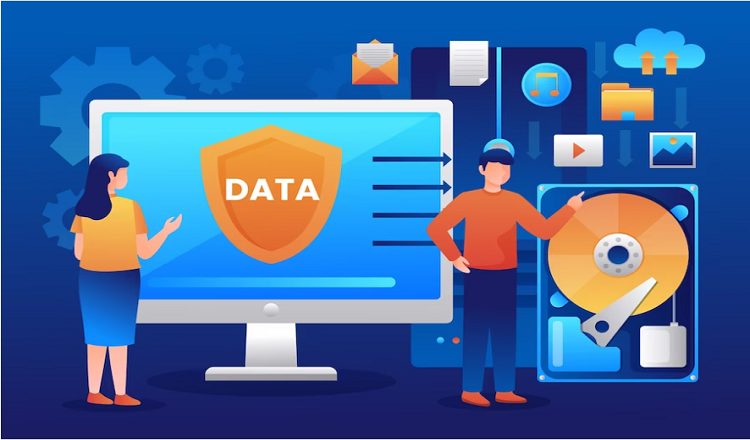The intersection of cybersecurity and data privacy with other areas such as intellectual property, internet governance, and human rights
Data privacy and cybersecurity have emerged as the top priorities for corporations, governments, and people alike in today’s interconnected world. The likelihood of threats to data security and privacy has grown tremendously along with our reliance on technology. Understanding how cybersecurity and data privacy overlap with other fields like intellectual property, internet governance, and human rights is therefore vital.
Fundamentally, cybersecurity refers to the safeguarding of electronic devices, networks, and systems from intrusion or attack. The correct management and protection of personal data, on the other hand, entails making sure that it is only accessible to those who are permitted. The significance of cybersecurity and data privacy cannot be emphasized in a world where cyberattacks and data breaches are on the rise. A single breach has the potential to cause large monetary losses, harm to a company’s reputation, and even jeopardize the security and privacy of individual users.
An essential subject that needs more research is how cybersecurity and data privacy relate to other topics like intellectual property, internet governance, and human rights. Due to their interdependence, a cybersecurity or data privacy breach may have far-reaching effects on the other sectors mentioned. In order to create successful policies and strategies that can protect cybersecurity and data privacy while respecting fundamental rights and intellectual property, it is essential to understand this junction. We shall examine this intersection in further detail and consider its relevance in the modern world in this essay.
Security of Data and Data Privacy
Data privacy and cybersecurity are two interrelated ideas that are essential for safeguarding information in the modern digital world. Cybersecurity entails defending networks, computer systems, and sensitive data from hacker attacks and unwanted access. Contrarily, data privacy refers to the careful management of personal data, ensuring that it is only accessible to those who need it and safeguarded from exploitation.
Because they shield people, companies, and governments from possible harm, data privacy and cybersecurity are essential. Cyber assaults and data breaches can cause large financial losses, harm to a company’s brand, and even harm to people’s personal life. Additionally, as good data privacy practices are required for efficient cybersecurity, cybersecurity and data privacy are related. Both cybersecurity and data privacy standards require that appropriate access controls, data encryption, and safe data storage be implemented.
Informational property
Creations of the mind, including inventions, literary and artistic works, designs, symbols, and names used in commerce, are referred to as intellectual property (IP). Intellectual property rights grant the creators exclusive rights to their works and shield them from infringement by outside parties.
The value of intellectual property comes in its capacity to reward artists with exclusive rights to their works, so encouraging innovation and creativity. By enabling creators to make money off of their work, these rights promote additional innovation.
There are various ways that intellectual property and cybersecurity are related. Trade secrets or works protected by copyright may be compromised as a result of data breaches and cyberattacks. Innovations in cybersecurity and data privacy, such as encryption technologies or other security measures, can be safeguarded via intellectual property rights. Additionally, unauthorized use of trademarked or copyrighted materials may result in legal troubles for intellectual property (IP) infringement. Therefore, it is crucial to preserve both intellectual property (IP) and cybersecurity/data privacy to guarantee a secure and creative digital environment.
Internet Regulation
The laws, regulations, and practices that influence how the internet is developed and used are referred to as internet governance. To guarantee that the internet runs in a safe, secure, and dependable manner, it involves the collaboration of numerous parties, including governments, business sector companies, and civil society organizations.
The ability of internet governance to maintain the open, inclusive, and accessible nature of the internet is crucial. It supports innovation, the free exchange of ideas, and online human rights protection. For the internet to continue to be a dependable and trustworthy medium for communication and business, effective internet governance is crucial.
The integrity of the internet and the privacy of its users are both protected by cybersecurity and data privacy, which are essential elements of internet governance. To make sure that they are in line with the broad objectives of a safe, secure, and inclusive internet, cybersecurity and data privacy policies must be developed and implemented in the framework of internet governance. Failure to do so may result in a loss of confidence in the internet and its users.
Rights of People
Human rights are the basic freedoms and rights that every person has by default, regardless of their race, gender, nationality, religion, or any other status. These rights encompass economic, social, and cultural rights like the right to education and healthcare, as well as civil and political rights like the freedom of expression and assembly.
The power of human rights to advance and safeguard equality, fairness, and human dignity is what makes them so significant. They are crucial to building a just and peaceful society where everyone is respected and treated with dignity.
Human rights and cybersecurity are intertwined because they can affect how easily people can exercise their rights online. Data privacy and cybersecurity violations can result in censorship, surveillance, and the repression of free speech, making it more difficult for people to access and exchange information without restriction. To ensure a secure and inclusive digital environment where human rights are respected and protected, it is essential that cybersecurity and data privacy practices are in line with human rights values.
Data privacy, cybersecurity, governance, rights, IP
For individuals, corporations, and governments, the convergence of cybersecurity, data privacy, intellectual property, internet governance, and human rights poses both challenges and opportunities. Finding a balance between safeguarding these important areas and encouraging innovation, creativity, and economic progress is one of the biggest problems.
Businesses and individuals must traverse complicated legal and regulatory frameworks to maintain compliance with cybersecurity, data privacy, intellectual property, internet governance, and human rights norms. This has substantial ramifications for both groups of people. If you don’t, you risk suffering serious monetary and reputational consequences.
Increased stakeholder cooperation, the creation of global standards and best practices, and investments in R&D to handle new risks and difficulties are some suggested solutions and proposals. In order to create a safe, secure, and inclusive digital environment for everyone, it is essential to acknowledge the significance of these vital areas and prioritize their protection.
Conclusion
Cybersecurity and data privacy are more crucial than ever in the current digital era. Prioritizing cybersecurity and data privacy is crucial because of the rising reliance on technology and the internet, which has raised the potential of cyberattacks and data breaches.
Furthermore, it is critical to comprehend how other topics like intellectual property, internet governance, and human rights intersect with cybersecurity and data privacy. Failure to do so may have serious negative financial, legal, and reputational repercussions as well as the possibility of grave human rights abuses.
It is critical to understand that data privacy and cybersecurity are interrelated issues that must be handled in the context of larger societal issues. To guarantee that cybersecurity and data privacy rules correspond with more general societal goals, cooperation across a variety of stakeholders, including governments, enterprises, civil society organizations, and individuals, is necessary.
In conclusion, a safe, secure, and inclusive digital environment for all depends on prioritizing cybersecurity and data privacy and understanding how these two issues overlap with other ones. To safeguard the integrity of the internet and the privacy of its users, it is crucial to be alert and proactive in tackling new threats and problems.
Read More You May Like:














Post Comment